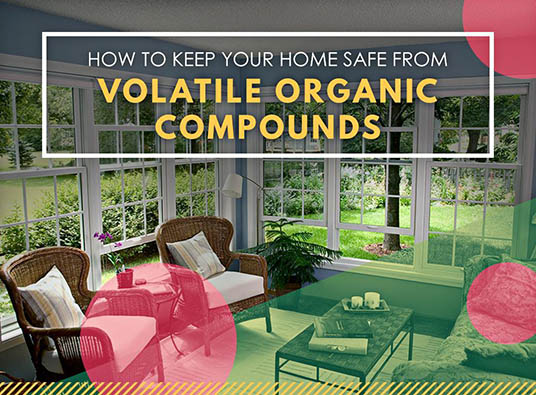

Poor indoor air quality (IAQ) is one of the leading health hazards that today’s homeowners are exposed to. With most people spending 90% of their time indoors – at home, at work, in restaurants – it’s important for homeowners like you to know what causes poor IAQ, control its source and keep your family healthy. Renewal by Andersen® of Atlanta discusses these and what a replacement windows installation project can do to help.
Volatile Organic Compounds
There are many possible sources of indoor air pollutants, like indoor smoking, unmaintained chimneys, mold and mildew. But the biggest contributor is probably the least you would suspect: volatile organic compounds (VOCs).
VOCs are emitted as gases – a process called off-gassing – from common household products like paint, cleansers, and pesticides. What makes VOCs more difficult to control is that they continue to be emitted for a long time after the products are purchased and used, sometimes even years down the line. Consequently, they could accumulate inside your home and cause anything from irritation, nausea, and dizziness, to damage to the liver, kidney, and central nervous system.
Maintaining Healthy IAQ
The most effective solution to keeping your IAQ within healthy levels is as simple as opening double hung windows – or any window style that allows sufficient airflow. If you regularly ventilate your home by opening your windows at least 15 minutes a day, you can keep indoor air pollutants within safe levels. Basically, you need two openings in a room: one lets the stale air out while fresh air cycles in through the other. Casement windows are ideal because the entire window can be opened to let fresh air in. Bay or bow windows are another – by opening both side windows at the same time, it achieves the same effect that two separate windows can. If the room can only accommodate one window, a double hung window is sufficient, as it can be opened in such a way that you can have a top and a bottom opening that achieves the same effect.
You should also choose responsibly manufactured replacement windows that emit minimal amounts of VOCs. Renewal by Andersen replacement windows are built with materials that meet the strictest air emission standards in the country, including the California Section 01350 Specifications. We, along with our parent company Andersen® Corporation have since been the only window companies to have received the Scientific Certification Systems (SCS) Indoor Advantage Gold™ certification.
If you would like to know more about replacement window styles like casement windows that help minimize indoor pollutants, call Renewal by Andersen of Atlanta today at (866) 609-5033 or fill out our contact form to schedule a free estimate and in-home consultation. We serve many areas in and around Atlanta.